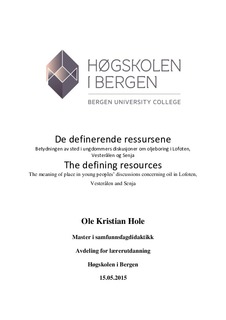| dc.contributor.author | Hole, Ole Kristian | |
| dc.date.accessioned | 2018-02-01T14:55:00Z | |
| dc.date.available | 2018-02-01T14:55:00Z | |
| dc.date.issued | 2015-07-06 | |
| dc.identifier.uri | http://hdl.handle.net/11250/2481548 | |
| dc.description | Masteroppgave i Samfunnsfagdidaktikk | en_GB |
| dc.description.abstract | I de siste tiårene har det vært en diskusjon om kystområdene utenfor Lofoten, Vesterålen og Senja (LoVeSe) skal åpnes for oljeutvinning. Områdene kan ha store oljeressurser, men samtidig er de levegrunnlaget til store fiskebestander som lokalbefolkningen har levd av i hundrevis av år. Oljenæringen kan utvikle stedene, noe flere mener det er behov for, men det er risikabelt, fordi oljenæringen kan ødelegge naturen og det lokalbefolkningen allerede har. I denne oppgaven har jeg undersøkt hvordan ungdommer i Lofoten og Bergen diskuterer oljeboring i LoVeSe. Oppgaven vil vise forskjellen mellom å oppleve stedet på avstand og å oppleve stedet fra innsiden. For ungdommene i Lofoten er stedet en del av deres identitet. Forskjellen viser seg i hvordan «for» og «mot» oljeboring er konstituert. I Lofoten er ikke dette en enkel dualisme, da ungdommene vil bevare naturen og utvikle stedet på samme tid. Vi ser også at ungdommene i Lofoten ikke bare opplever en tilhørighet til det lokale stedet, men også til Nord-Norge og Norge. De ulike geografiske nivåene gir ulike forståelsesrammer for saken, der Nord-Norge oppleves i kontrast til maktsentrum, og Norge oppleves som en oljenasjon. Diskusjonen bærer slik preg av å være en forhandling om å definere felles stedsidentiteter, og et felles «vi». Saken berører ikke ungdommene i Bergen på samme måte. Vi ser også en forskjell i hvem som oppfattes som aktører i saken. Turismen er kun en aktør i diskusjonene i Lofoten. | en_GB |
| dc.description.abstract | The last few decades have seen discussions concerning opening the coastal areas outside Lofoten, Vesterålen and Senja (LoVeSe) in Northern Norway for oil exploitation. The areas may have considerable oil reserves, but it is at the same time the most important spawning area for great fishing stocks that has been the livelihood for the locals for hundreds of years. The oil industry may develop local settlements and places, as many think is necessary, but it is risky, since oil extraction may be hazardous for the nature and consequently the locals’ home place. In this thesis, I have researched how high school pupils in Lofoten and Bergen discuss oil extraction in LoVeSe. The thesis illustrates that there is a difference in experiencing the place from a distance, and experiencing it from the inside. For the youth in Lofoten the place is a part of their identity. The difference shows itself in how «for» and «against» oil exploitation is constituted. This is not a simple dualism in Lofoten as the teenagers both want to take care of the nature, but also develop the place at the same time. We can also see that the teenagers in Lofoten do not only identify with the local place, but also Northern Norway and Norway as well. The different levels of geographical scale sets different frameworks of understanding. Northern Norway as a contrast to the central government, and Norway as an oil nation. This makes the discussions about defining their common place identities, and a common “we”. The case does not have the same effect on the teenagers in Bergen. We can also see a difference in who is considered as agents in the case. Tourism is only considered an agent in the discussions in Lofoten. | en_GB |
| dc.language.iso | nob | en_GB |
| dc.title | De definerende ressursene. Betydningen av sted i ungdommers diskusjoner om oljeboring i Lofoten, Vesterålen og Senja | en_GB |
| dc.title.alternative | The defining resources The meaning of place in young peoples’ discussions concerning oil in Lofoten, Vesterålen and Senja | en_GB |
| dc.type | Master thesis | en_GB |
